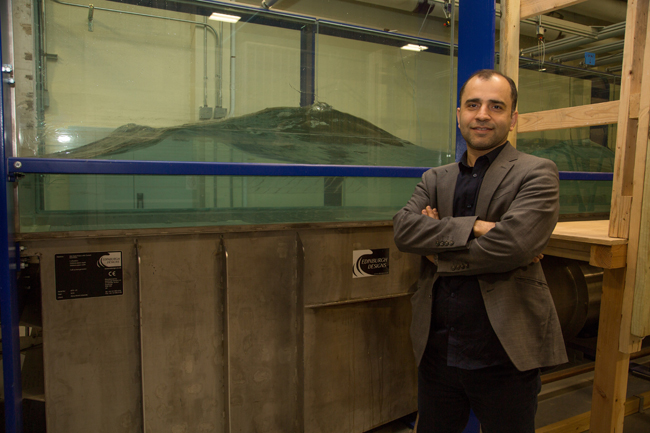Stony Brook and Oswego, NY, November 14, 2022 — New York Sea Grant invited stakeholders to participate in a statewide symposium on the status of recent coastal bluff research. This two-hour symposium was built upon Stony Brook University (SBU)’s workshop Erosion and Recession of Coastal Bluffs: Characterizing erodability of bluff materials under various land and sea-based conditions, sponsored by New York Sea Grant and held in August 2020 (see video from nand info about that discussion below).
Coastal bluffs occupy a significant percentage of the shorelines along Long Island and New York’s Great Lakes. The unconsolidated sediment composition of these structures make them susceptible to land- and sea-based erosive forces. Bluff recession poses a substantial risk to homes and other infrastructure and valuable ecosystems.
During this symposium, attendees were provided with updates on research projects currently underway along both the Long Island and Great Lake bluff shorelines from SBU, The Nature Conservancy and NYS Department of Environmental Conservation, and the US Army Corps of Engineers.
The symposium and follow-up survey offered NYSG opportunities to gather input from stakeholders on the research methods and learn more about the bluff erosion they have observed on their nearby shorelines.
Stony Brook and Oswego, NY, August 19, 2020 - New York Sea Grant welcomed stakeholder input on the research methods of a new study and learned about the bluff erosion that these stakeholders are experiencing.
The webinar, held on August 19th, was for a NYSG-funded project on "Erosion and Recession of Coastal Bluffs" led by Dr. Ali Farhadzadeh at Stony Brook University.
Coastal bluffs occupy a significant percentage of the shorelines along Long Island and New York’s Great Lakes. The unconsolidated sediment composition of these structures make them susceptible to erosive forces. Bluff recession poses a substantial risk to homes and other infrastructure and valuable ecosystems. This project will explore some of the most critical processes and factors that are involved in bluff recession to develop a modeling framework that can provide more accurate predictions of coastal bluff erosion.
Results from the project will be useful for resource managers and property owners to be better equipped to predict and respond to future erosion events.
For more on this topic, visit NYSG's "Marine Coastal Hazards & Processes / Marinas" and "Great Lakes Coastal Processes & Erosion" resource sites at, respectively, www.nyseagrant.org/marinecoastal and www.nyseagrant.org/glcoastal.

Stony Brook University researcher Ali Farhadzadeh, Ph.D., also leads a study that is developing a basis for computer modeling to address Eastern Lake Erie erosion, sediment transport and depositions under a changing climate. That project, part of a $122K research suite funded by the Great Lakes Research Consortium, got underway in summer 2019. Credit: Stony Brook University.
Presentations
Erosion and Recession of Coastal Bluffs: Characterizing erodability of bluff materials under various land- and sea-based conditions
New York Sea Grant | PDF
Henry Bokuniewicz | PDF
Ali Farhadzadeh | PDF
Relevant Links
Bluff Erosion Survey - Long Island | Great Lakes
Post Workshop Survey | Click Here
More Info: New York Sea Grant
New York Sea Grant (NYSG), a cooperative program of Cornell University
and the State University of New York (SUNY), is one of 34 university-based
programs under the National Oceanic and Atmospheric Administration’s
National Sea Grant College Program.
Since 1971, NYSG has represented a statewide network of integrated
research, education and extension services promoting coastal community
economic vitality, environmental sustainability and citizen awareness
and understanding about the State’s marine and Great Lakes resources.
Through NYSG’s efforts, the combined talents of university scientists
and extension specialists help develop and transfer science-based
information to many coastal user groups—businesses and industries,
federal, state and local government decision-makers and agency managers,
educators, the media and the interested public.
The program maintains Great Lakes offices at Cornell University, University at Buffalo, SUNY Oswego and the Wayne County Cooperative Extension office
in Newark. In the State's marine waters, NYSG has offices at Stony Brook
University in Long Island, Brooklyn College and Cornell Cooperative
Extension in NYC and Kingston in the Hudson Valley.
For updates on Sea Grant activities: www.nyseagrant.org has RSS, Facebook, Twitter, Instagram, and YouTube links. NYSG offers a free e-list sign up via www.nyseagrant.org/nycoastlines for its flagship publication, NY Coastlines/Currents, which is published quarterly. Our program also produces an occasional e-newsletter,"NOAA Sea Grant's Social Media Review," via its blog, www.nyseagrant.org/blog.